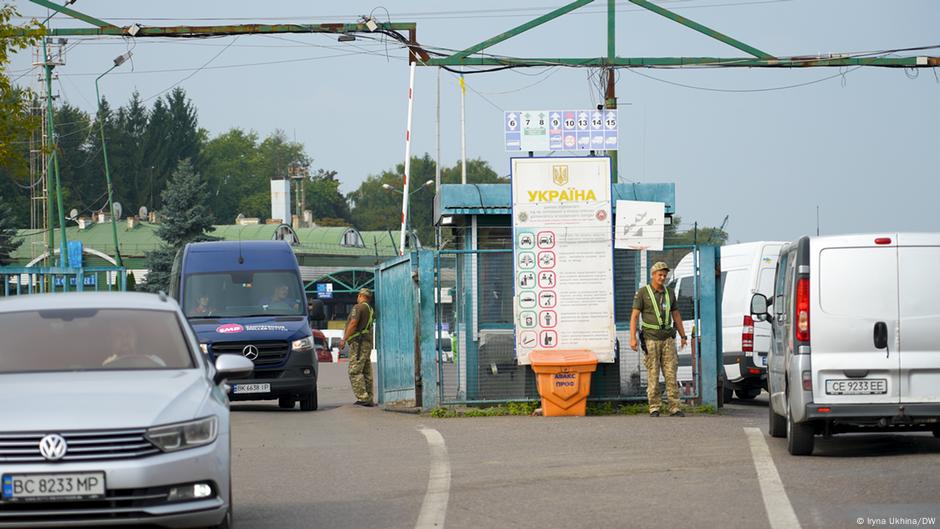[ad_1]
It is 9:00 in the morning. Buses and cars are passing slowly through the Shehyni checkpoint in the region of Lviv, a city close to Ukraine’s border with Poland. There is no line for pedestrians, most of whom are elderly people, women and children. There are also several men of all ages.
At the end of August, the Ukrainian government allowed men aged 18 to 22 to leave the country, where martial law has been imposed since Russia’s full-scale invasion of Ukraine in February 2022. Ukrainian President Volodymyr Zelenskyy said the decision would keep more young men in Ukraine by giving them the freedom to leave and return as they pleased. He insisted the new rule would not impair the country’s defense capabilities.
The move has sparked a debate in Ukrainian society. There are those who view the change positively, while others claim it’s unfair to active military personnel and recruits.
There are also some critics who believe that a number of the young men leaving now won’t return.
Why do young Ukrainian men want to go abroad?
DW spent three hours at the Ukrainian-Polish border, speaking with several men who were crossing into Poland. Their reasons for leaving Ukraine were varied.
Mykola, 22, is a bus driver from the Ivano-Frankivsk region. He said that he wanted to visit his brother-in-law in the Polish city of Krakow. “For a week or two at most,” he said, insisting he would be returning home where his girlfriend awaited him.
Ilya, also aged 22, from Kryvyi Rih, was on his way to Warsaw, the Polish capital, where he planned to visit relatives.
“The moment has come, and we have to seize the opportunity to see our relatives for a few days,” he said.
DW also spoke with nine Ukrainians, aged 18 to 21, who were on their way to Wroclaw for a football match. For some of the friends, who were traveling in a minibus, it was their first trip abroad. They said they had decided to take a few days off ahead of the match. After the game, they said, they would return to Ukraine to pursue their studies.
Ivan, a 21-year-old dancer, was crossing with his mother, Gloria. They had no suitcases with them, just shopping bags. Their only plan was to go to the supermarket in Poland.
“I’ll help my mother carry the bags, they’ll probably be heavy,” said Ivan. Their aim was to return to Lviv, where they live, the same day.
For now, Ivan has no plans to go abroad for a longer period. He visited many countries as a dancer, he explained. And although the loosening of the regulations mean he could potentially take part in international dance competitions abroad again, he wants to stay in Ukraine and continue his studies, he told DW.
“Next year, I am doing a Master’s at the Polytechnic Institute. I’m happy with everything here. Of course, the war is bad, but I have family and friends here.”
Andriy, 21, from Ivano-Frankivsk, told DW that he wanted to go abroad to make more money. He has worked in the oil and gas industry in Ukraine and hopes to find a job as a welder in the Netherlands, where he already has relatives and acquaintances.
He would probably return to Ukraine for New Year’s and the holidays but not for longer, he said.
Ukrainian men aged 25 subject to mobilization
According to the new regulations, men aged 18 to 22 (until the day before they turn 23) can go abroad as often as they like. Those who choose not to return won’t face any criminal consequences.
From the age of 25, Ukrainian men are subject to mobilization. A 25-year-old man who does not return to Ukraine and report to the military could face prosecution.
Roman is a minibus driver who transports people to the Czech Republic and Germany. He said that there had been an increase in travelers since the new regulations came into force.
“There have been a lot of inquiries this week,” he said.
He explained that every week he received calls from between five and 10 men. This week, Mykola from Ivano-Frankivsk is with him. Next week, he’ll transport another 22-year-old.
Mykola told DW that he definitely wanted to go back to Ukraine. “Home is home. I can’t imagine myself abroad and don’t want to live there.”
Rise in passenger traffic because of summer season
The border officials told DW that they hadn’t seen a significant rise in young men leaving Ukraine since the regulations changed.
“The increase in passenger traffic at checkpoints in the Lviv region has nothing to do with the 18-22 age group,” said Svitlana Burda, a spokesperson for the border guard unit. She said that there were some members of that age group at the checkpoints “but not in large numbers.”
She attributed the rise in numbers at the checkpoint to summer tourism.
“Passenger traffic is still reaching peak levels at the checkpoints in the Lviv region,” she said, “with 40% more than before the summer season.”
Passenger traffic at the weekends had increased by 16% but that generally numbers were expected to decline by the end of September, Burda told DW.
‘No one changes their life overnight’
Andriy, who is on his way to find work abroad, is pleased about the new regulations. “People will begin to believe in something better, they will be able to travel, earn money and go on holiday.”
Roman, the minibus driver, agreed. “If there is a chance to return and go abroad again, it will keep young people in Ukraine,” he said, adding that otherwise they would be more likely to stay abroad.
Ivan’s mother, Gloria, believes that most young Ukrainians who wanted to leave the country for good had already done so.
Some young people might still leave, she said, but most will keep building a life in Ukraine, leaving only to go on holiday or see something of the world.
“No one changes their life overnight,” she said. “Just to get out of Ukraine?”
This article was originally published in Ukrainian.
Source link

